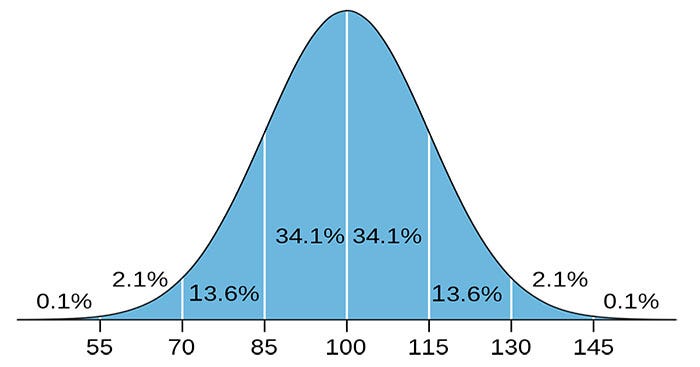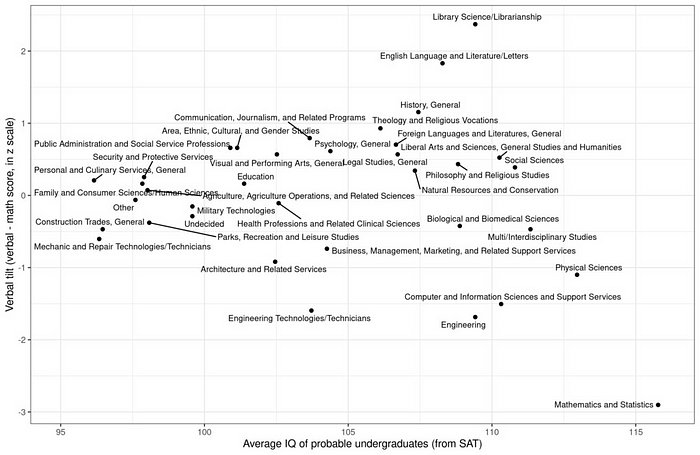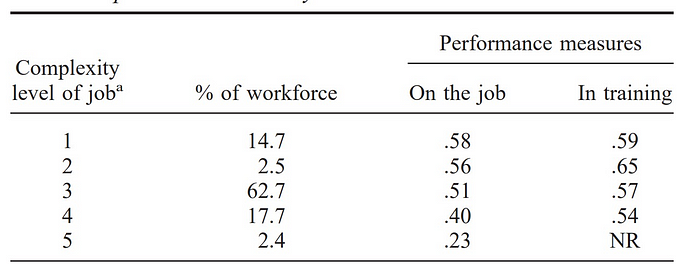Yet another piece about IQ
In this article, we will dive into the study of an entertaining and sometimes controversial phenomenon — IQ. This is a fascinating attempt by scientists and psychologists to measure the immeasurable — human intelligence.
The topic of IQ often sparks lively debates in society. Today we will understand how much IQ really affects life, whether it is possible and necessary to increase the level of intelligence, as well as understand why you need to know your IQ level.
What is IQ?
IQ is a specialized intelligence test designed as an attempt to measure a person’s general intelligence quotient.
The concept of IQ was first proposed by German psychologist William Stern in 1912. It was a test that shows the ratio of intellectual age to biological age. Now, on the vastness of the Internet, every second entertainment site offers its own version of the IQ test. Such tests, as a rule, do not have a scientific basis and trust their results is not worth it.
The most accurate and real IQ tests cover as many areas of human intelligence as possible and are conducted live by licensed psychologists and specialists, so no test from the internet can show you an accurate and reliable result. Intelligence tests are specifically designed so that their results can be evaluated using a normal distribution scale.

The average IQ is considered to be 100 points with a 15-point deviation in the positive or negative direction. That is, if we make a group of people take an intelligence test, we will find out that about 68% of people have an IQ between 85 and 115 points.
IQ tests assess logical thinking, mathematical ability, verbal skills, and memory, but do not reflect creativity, emotional intelligence, and other important qualities of a person, which is why intelligence tests are often criticized.
Criticism
The advent of the first intelligence tests sparked a lively debate, with some people believing that IQ did not reflect all aspects of intelligence, including creativity and emotional intelligence, while others argued that a high IQ was the key to success.
Many critics say that IQ tests fail to measure or underestimate factors such as emotions, social and non-cognitive skills, motivation and even morality. However, this can be answered by saying that IQ is a measure of purely cognitive abilities and therefore cannot be invalidated by the exclusion of non-cognitive abilities.
A more serious criticism has to do with whether IQ tests actually test a person’s thinking properly.
Nobel Prize winner Daniel Kahneman has shown in his book Thinking, Fast and Slow that in the real world, human intelligence is highly susceptible to cognitive distortions that cause us to make irrational errors in judgment. Some people make more of these errors, but IQ tests don’t pick up on this difference.
IQ tests may not measure the ability to act rationally and achieve goals. This raises the question of how reliable they really are.
IQ test results have been proven to have a high margin of error and can vary greatly depending on the day, the testing conditions, and even the communication with the person administering the test.
Although IQ tests are imperfect, they do reveal certain cognitive abilities associated with success in many areas of life. Let’s take a look at some of the correlations.
Correlations
Despite all the flaws, studies show surprising correlations between IQ and important aspects of our lives such as career choices, academic performance, and even mental health. Recall that a correlation is a statistical relationship between two variables.
IQ and academic performance

The SAT is a standardized test used in the United States to assess the academic preparation and aptitude of applicants for admission to colleges and universities. It is analogous to our USE.
In front of you is a graph of the dependence of SAT scores on the level of students’ IQ. As we can see, there is a strong positive correlation between SAT scores and IQ (r = 0.8). This means that the higher the student’s IQ, the higher the SAT score he or she can get. This is also true in the opposite direction: the higher the SAT score, the higher the student’s IQ can be. For example, a student with an IQ of 120 on average scores about 1350 on the SAT. However, this correlation is not absolute — IQ does not completely determine SAT score, nor does the SAT determine IQ 100%. A specific score for an exam depends on other factors — motivation, quality of preparation, and emotional state on the day of the exam. Therefore, it is impossible to say in advance what score a student will get. But statistics is statistics: to get into Harvard you need to score about 1550 points on the SAT, which corresponds to an IQ of about 130–140. Therefore, it is extremely difficult for a person with an average intelligence level of 100–110 points to enter such a prestigious university.

However, exam results do not only depend on IQ level. The effort put into studying also plays an important role. As the second graph shows, students who were not serious about their studies, despite their high intelligence, scored much lower on the SAT than their diligent peers with lower IQ levels.
SAT scores are closely related to students’ IQ levels. Now let’s look at different majors at universities and their average IQs.

This graph shows the different majors at universities. The vertical axis is a verbal or math major, and the horizontal axis is the IQ level of students based on SAT scores. As you can see from the graph, the major with the highest IQ greater than 115 is math and statistics. It also has the lowest verbal score. Library Science and English are the majors with the highest verbal scores. Among the majors with low average IQ scores less than 100 are mechanics, personal and culinary services, and construction occupations.
IQ is of paramount importance in the academic field and can predict student performance with high accuracy. But does intelligence have an impact on later life, in the professional sphere? Let’s find out.
IQ and occupations
Let’s take a look at this table that clearly shows the average IQ in different professional fields.
Accountants, lawyers, engineers and PR-managers have the highest average IQ — over 120 points. But representatives of working professions — farmers, drivers, miners — have an IQ below average, about 92 points.



Another study shows that the higher your IQ, the better and more quality work you will do, with the more complex your job, the higher the correlation between IQ and performance.

In addition, the higher your IQ, the more you will earn! A person with an IQ of 120 earns on average 75% more income than a person with an IQ of 100.
What this all means: Those with above average IQs have a much easier time succeeding in challenging professions. That’s what the statistics show. But this does not mean that a person with an average IQ cannot “overtake” a person with an IQ much higher than their own. Of course, there are professions in which the level of intelligence can be a decisive factor — these are, as a rule, precise specialties: engineers, programmers, physicists, chemists. But we should not forget about creative fields: designers, photographers, architects. In such professions, IQ is usually not so important. Although statistics show certain regularities, IQ does not always predetermine the professional achievements of a person. With proper persistence and motivation, a person with an average level of intelligence may well succeed in a difficult profession, overtaking those whose IQ is initially higher.
Other correlations

Of course, IQ level has the strongest influence on academic and professional success, but there are other, less significant correlations. For example, people with higher IQs are less likely to be involved in fatal car accidents, are objectively happier, and are less likely to suffer from brain disease in general. However, high IQ is not always a good thing. The likelihood of developing schizophrenia increases with IQ, smarter people have more difficulty socializing with others, even the number of children is lower for people with high IQs!
Is it possible and necessary to increase IQ?
The idea of increasing your IQ may seem appealing. After all, plenty of studies show that people with higher IQs, on average, achieve greater academic and professional success. But is it worth making a concerted effort to raise your IQ?
Indeed, there is evidence that an extra year of schooling can increase IQ by 1–5 points. (https://www.ncbi.nlm.nih.gov/pmc/articles/PMC6088505/pdf/10.1177_0956797618774253.pdf) However, this only happens early in development when the brain is forming. In adults, this effect is unfortunately absent.
Closer analysis shows that the increase in IQ is not caused by an improvement in general intelligence (g), but by the development of specific skills, such as math or linguistic skills. In other words, education improves the “software” rather than the “hardware” of the brain.
Various popular methods of improving memory, attention, and thinking speed often have only short-term effects in mastering the tasks being trained. There is no transfer to general intelligence. More than 100 years of research shows that training specific skills does not increase IQ in general. (https://psycnet.apa.org/record/1926-02967-001).
Yes, you can learn how to correctly solve IQ tests by understanding how they are made up, but in reality intelligence is 80% dependent on your genetics. So don’t try to change anything.
Conclusion
Despite the limitations of IQ as a measure of intelligence, knowing your score can be helpful. You can make a sensible assessment of your abilities, see where you can excel and what you should refrain from doing.
IQ is only one way of assessing a person’s intelligence and has certain limitations. While we have looked at some areas where intelligence does matter, factors such as motivation, emotional intelligence and willpower play a much bigger role in life. Therefore, you shouldn’t get hung up on increasing your IQ. It is more important to focus on developing useful skills and qualities that will really benefit you in life.
Thanks for reading.
